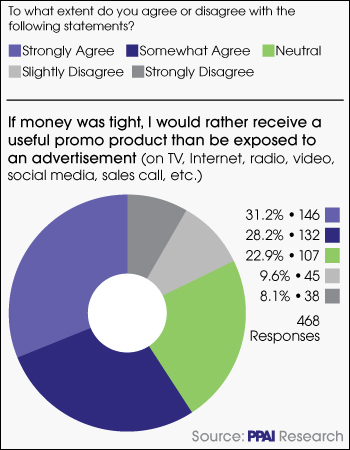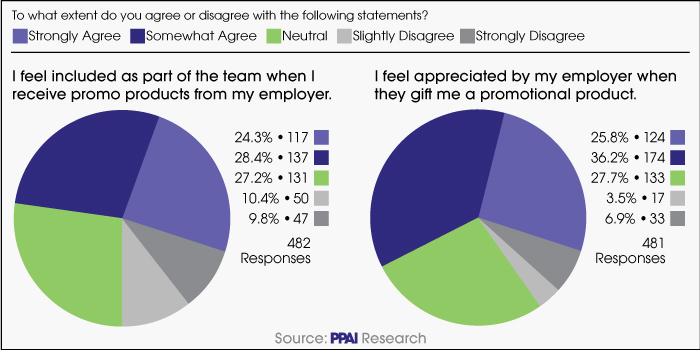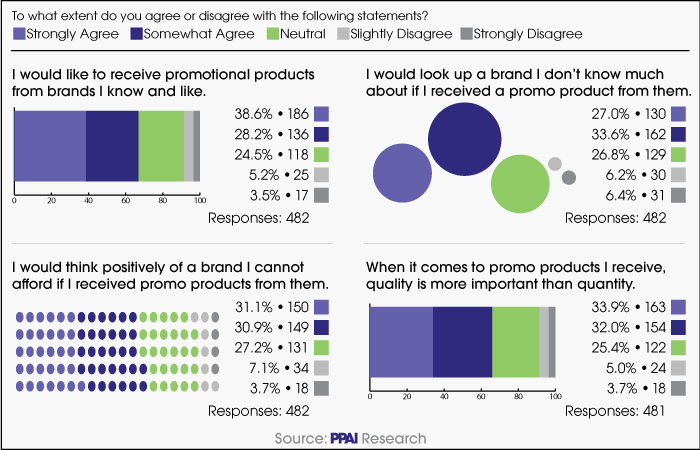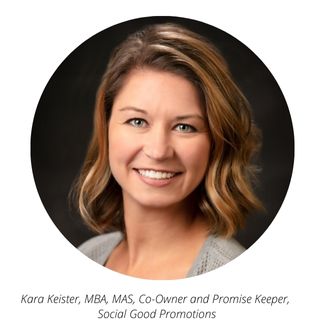PPAI Research: Consumers Covet Promo During Economic Hardships

Will the economy enter a downturn? Maybe. Signs point to a recession on the near horizon, but expectations are that it will be modest in scope and duration. Regardless, softening economies often cause lean times for businesses as they make cuts and scale back.
Promo companies have dealt with recessions before, both within their own operations and working with clients. And new PPAI Research shows that even in a downturn, promotional products can be as valuable as ever.
 In fact, promo’s value to its end-users, relative to other forms of advertising, only goes up during a downturn. In February, PPAI conducted a survey of more than 480 consumers asking about their attitudes toward different forms of advertising during periods of economic hardship they've experienced.
In fact, promo’s value to its end-users, relative to other forms of advertising, only goes up during a downturn. In February, PPAI conducted a survey of more than 480 consumers asking about their attitudes toward different forms of advertising during periods of economic hardship they've experienced.
A shareable, client-friendly summary of the results is available at PPAI.org/Research. PPAI members also have access to the full results of the survey.
It found that, during times of economic hardship, 59% of people would rather receive a useful promotional product than be exposed to ads on television, social media, radio and other forms of advertising.
“The results are clear; promotional products make people feel special, especially when times are tough,” says Robert Fitzpatrick, PPAI research manager. “Whether employers are aiming to boost morale or businesses are trying to reach new customers, promotional products can help. Not only do people want more useful promotional merchandise, but they’re open to it coming from brands they’re familiar with and brands they’re new to.
“Promotional products strengthen the loyalty of existing customers and employees, while also opening the door for building relationships with new clients.”
Managing A Business
Downturns can put significant demands on a company and its staff. Affected businesses may struggle with budget cuts, staffing shortages and other pressures. Employees can be under considerable strain as they work to do more with less.
For most businesses, the COVID pandemic was the most recent downturn. Promo industry businesses contended with it along with everyone else.
“Social Good Promotions was incorporated in January 2019 and really got off the ground April/May of that same year. We were very much still in our infancy when COVID hit and turned our world upside down,” says Kara Keister, MBA, MAS, co-owner of and promise keeper at Carey, Ohio, distributor Social Good Promotions. “Our strategy during that time was to utilize our small size to our advantage and lean into our business model and core values. Our business is fully remote, so we were already set up to work from home successfully. Our team was also very small at a total headcount of two, so we were able to quickly reduce or eliminate salary and overhead costs where many larger distributorships could not.”
For larger organizations, the data from PPAI’s study shows that promotional products are valuable tools for building and reinforcing employee loyalty and a collaborative environment.
- The Association’s survey found that 53% of people feel included in their team when they receive promotional products and 62% feel appreciated by their employer when they receive promotional products.
- The study found that employees between the ages of 47 and 74 are the most likely to feel appreciated when receiving promotional products from an employer. Data from the U.S. Census Bureau shows the highest median incomes among Americans between the ages of 45 and 54, so this can explain in part why a gift versus more money may make employees in this age group feel more appreciated.
“It’s easy to lose track of disillusioned employees during a downturn,” says Robert Fiveash, co-owner of Raleigh distributor Brand Good. “Are they fearful about their job security? Yes. Show them love and give them confidence. Are they looking at other opportunities? Yes. Keep your company and why it should be considered a viable longer-term employer top of mind. Thoughtful, targeted, and personalized branded merch to employees can do both.”

Successfully managing a downturn also demands a certain amount of agility on the part of management to seek out solutions and pivot to new opportunities.
“Other than during the immediate fear of the unknown of COVID, we have generally avoided layoffs during previous downturns,” says Fiveash. “We’ve cut expenses where we could – compensation adjustments for the two owners, renegotiating various renewals, less travel, etc. – and tried to hold onto the business we had. That means being even better – more creative with products and ideas, and more proactive than normal. Just as kitting was a lifeblood for companies during COVID, we all should explore similar pivots if ‘traditional’ sales decline during a downturn.”
 Recessions and downturns are rarely evenly distributed. Business managers should keep an eye out for trends that aren’t declining and any sectors of the economy that continue to grow. Fiveash notes that the tech sector was significantly underwater in the 2001 downturn, but virtually unscathed in others. And opportunities can found in industries where demand is inelastic no matter the state of people’s income – healthcare, home improvement, utilities, communications and technology for home offices, big box retailers and consumer staples, to name a few. Healthcare actually grew during the downturns of 1990 and 2001.
Recessions and downturns are rarely evenly distributed. Business managers should keep an eye out for trends that aren’t declining and any sectors of the economy that continue to grow. Fiveash notes that the tech sector was significantly underwater in the 2001 downturn, but virtually unscathed in others. And opportunities can found in industries where demand is inelastic no matter the state of people’s income – healthcare, home improvement, utilities, communications and technology for home offices, big box retailers and consumer staples, to name a few. Healthcare actually grew during the downturns of 1990 and 2001.
Managers have a toolkit available to them, of which promotional products are a valuable part, to lead their organizations through a recession. Fiveash says, “We don’t have a magic bullet about how to weather inevitable downturns, but watching expenses, making sure existing good customers are happy, and being proactive about prospecting sectors that might be doing better, are all important ways to come out the other side in better shape.”
Brand-Building
Promotional products reinforce and create consumers’ relationships with brands during the best of times, but during a down economy they are particularly important. PPAI’s research shows that 67% of people would like to receive promotional products from brands they know and like. This is particularly acute among people between the ages of 35 and 46, with more than two-thirds receiving promotional merchandise from their preferred brands.
- The 35-46 age group is also the most likely to receive promo from the brands they know and like.
- And they return the attention. PPAI’s survey found that this age group is the most likely to purchase a product from a known company who sends promotional products over a known company that does not.
And among those that aren’t familiar with a brand, 61% said that they would look up a brand they didn’t know if they received a promotional product from them. And promo’s goodwill extends to products consumers aren’t necessarily in the market for. The Association’s study found that 62% of people think positively about a brand they cannot afford if they receive promotional products from them.

“It’s a tricky balance to make sure that we provide value to our clients’ brands when finances are an issue,” says Keister. “Our sports-centric clients utilized promo to continue programming at home when gyms were closed. We created journals to encourage daily activity and mental health check-ins for those same groups.
“Our restaurant clients worked with us to create items that enhanced takeout and delivery orders. We created various online fundraisers using T-shirts, drinkware, even charcuterie to help nonprofit clients that lost significant income due to lack of in-person events.”
Customer Relationships
Promotional products are invaluable tools for reinforcing businesses’ relationships with their clients. PPAI’s study found that 83% of respondents identified promo as strengthening their loyalty to the brands they already do business with.
- The survey results were robust across all age groups, peaking among consumers between the ages of 59 and 74 (90%).
“It’s mostly about staying connected to your audience,” says Fiveash. “If marketing budgets are one of the first things clients cut, maybe we can show them that they can stay ahead of their budget-cutting competitors by using creative branded merch to raise awareness. The perfect time to grab market share is when your competitors are lowering their visibility.
“Maybe we can show them that if they must cut somewhere, then the ROI-creating merch solutions we’re showing should be last on the list.”
Promo also can play a role in mitigating business pressures stemming from a recession. As companies start to downsize and tasks are given to employees who may have less training, PPAI’s research shows that promotional products offer a way to help businesses maintain a positive “feeling” in the mind of their customers.
 The study found that a clear majority of consumers (81%) would come away with a positive impression of a business if, along with the resolution of a customer service issue, they received a promotional product.
The study found that a clear majority of consumers (81%) would come away with a positive impression of a business if, along with the resolution of a customer service issue, they received a promotional product.
- Consumers between 59-74 are the most likely to think positively of a brand after having a customer service issue resolved, if they receive promotional products.
Businesses’ core ideals are reflected in their customer connections. “It was important to us to lean into our mission to make the world a better place,” Keister says. “So no matter what, we put our clients first, we were transparent with the issues surrounding inventory and production, and leaned in with suppliers that share our beliefs.
“Buckling in during the downturn actually set us up for growth when the skies started to clear.”

